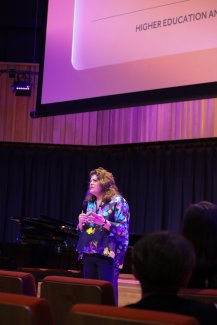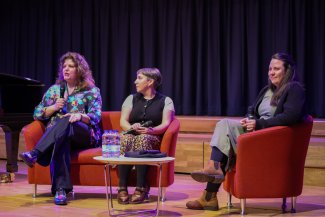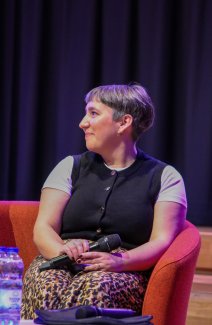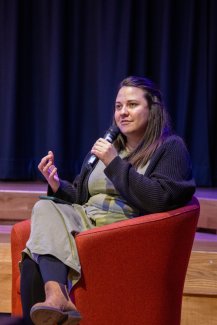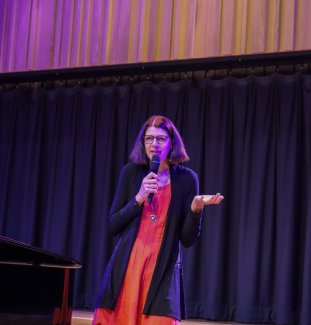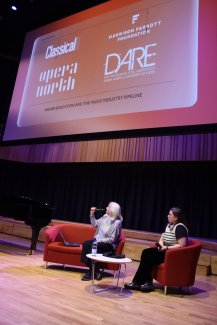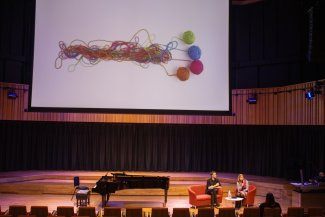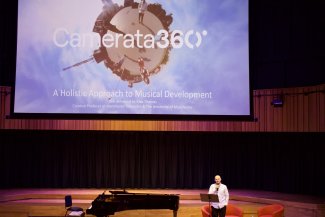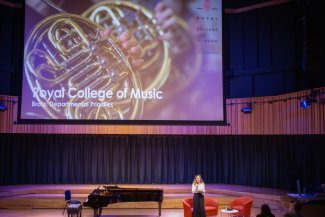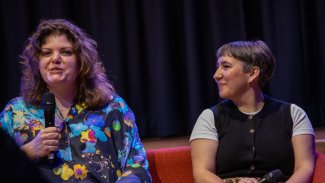
Insights from the ‘Higher Education and the Music Industry Pipeline’ Symposium
12/11/2024
On Friday, 8 November, the HarrisonParrott Foundation, in collaboration with the University of Liverpool, hosted the highly anticipated Higher Education and the Music Industry Pipeline Symposium at the Tung Auditorium. The day was an electrifying mix of presentations, workshops, and performances, designed to explore the relationship between higher education and the music industry, offering attendees an opportunity to reflect, collaborate, and innovate.
Delegates from across the sector were greeted with an insightful and engaging welcome by Dr. Ruth Minton, setting the tone for a day filled with thought-provoking ideas, confronting statistics, and meaningful dialogue.
The Transformative Power of Partnerships
The opening panel discussion delved into how partnerships can transform both higher education and the music industry. Dr. Minton and Dr. Sarah Price from the University of Liverpool joined Nicola Hopson from the Royal Liverpool Philharmonic to examine the practical and cultural benefits of collaboration. They highlighted how aligning institutional priorities with industry needs can create win-win scenarios that better prepare students for professional success while fostering innovation in the arts.
Fostering Creativity through Mentorship and Engagement
A standout session led by Nicky Goulder, Founding CEO of Create, underscored the importance of mentorship and skills development in nurturing young talent. Goulder’s call to action was clear: the future of music relies on providing equitable access to the resources and opportunities that shape the next generation of creatives.
In a complementary discussion, Jacqui Cameron, Director of Learning and Engagement at Opera North, and Alice Jones, Associate Artist Manager at HarrisonParrott, shared a dialogue about how industry x education partnerships have real, tangible benefits. Alice Jones, who is an incumbent Associate Artist Manager at HarrisonParrott, launched her career through Opera North’s DARE partnership with the University of Leeds. Alice offered a poignant example of how structured initiatives can open doors to lasting opportunities.
Unravelling the Threads of the Industry
Catherine Arlidge MBE, Artistic & Educational Director at the National Children’s Orchestra, and Tom Spurgin, Creative Director for Learning & Engagement at CBSO, presented a gripping metaphor: the music industry as a tangled thread. Using “Ben,” a fictional young musician, as their lens, they illustrated how today’s industry presents both immense challenges and exciting opportunities. Themes of diversity, resilience, and adaptability resonated strongly with the audience, sparking lively post-session discussions.
Innovative Approaches to Holistic Development
Max Thomas, Creative Producer at Manchester Camerata, introduced the Camerata 360° programme, which combines music-making with outreach projects, coaching, mentoring, mindfulness and mental health support. His session emphasised the growing recognition of well-being as a crucial component of artistic development, particularly in a high-pressure industry.
Championing Inclusivity and Creative Careers
The Royal College of Music’s Amos Miller and Leila Hooten explored how higher education can adapt to a rapidly evolving music landscape. Their focus on supporting neurodivergent students stood out as a best-practice model, illustrating how tailored guidance and diverse skill-building can empower graduates to thrive in competitive and changing environments.
Reflecting on Values and Sector Challenges
Manus Carey and Sophie Iiaifar of RNCM provided an illuminating perspective on the institution’s guiding principles, while Dr. Claire Mera-Nelson of Arts Council England issued a powerful call for a fairer and more inclusive classical music sector. Mera-Nelson’s thought-provoking address left the room buzzing with questions about equity, access, and responsibility in music education and beyond.
A Day of Reflection, Connection, and Celebration
The day culminated with a heartfelt closing by HarrisonParrott Foundation Manager, Lissy Kelleher-Clarke, who encouraged attendees to continue the dialogue. This sentiment carried seamlessly into the side-by-side concert featuring HP Artists, professional musicians, and University of Liverpool students.
The evening’s performance, showcasing OPUS 1 works by both established and contemporary composers, was a poignant reminder of the courage and creativity that mark the start of every artistic journey. The concert was not just a celebration of talent but also a call to action — an invitation to support and champion the next generation of musicians.
Systemic Solutions to Systemic Problems
The Symposium offered far more than a series of presentations; it was a dynamic, interactive experience that left attendees energized and inspired. Themes of collaboration, inclusivity, and innovation echoed throughout the day, providing a roadmap for the future of music education and industry partnerships.
For attendees, the key takeaways were clear: whether unravelling threads, creating holistic programs, or building partnerships, the future of music requires bold thinking and shared responsibility.
As one delegate noted, “It was a day that reminded us why we do this work — and how much further we can go if we do it together.”
